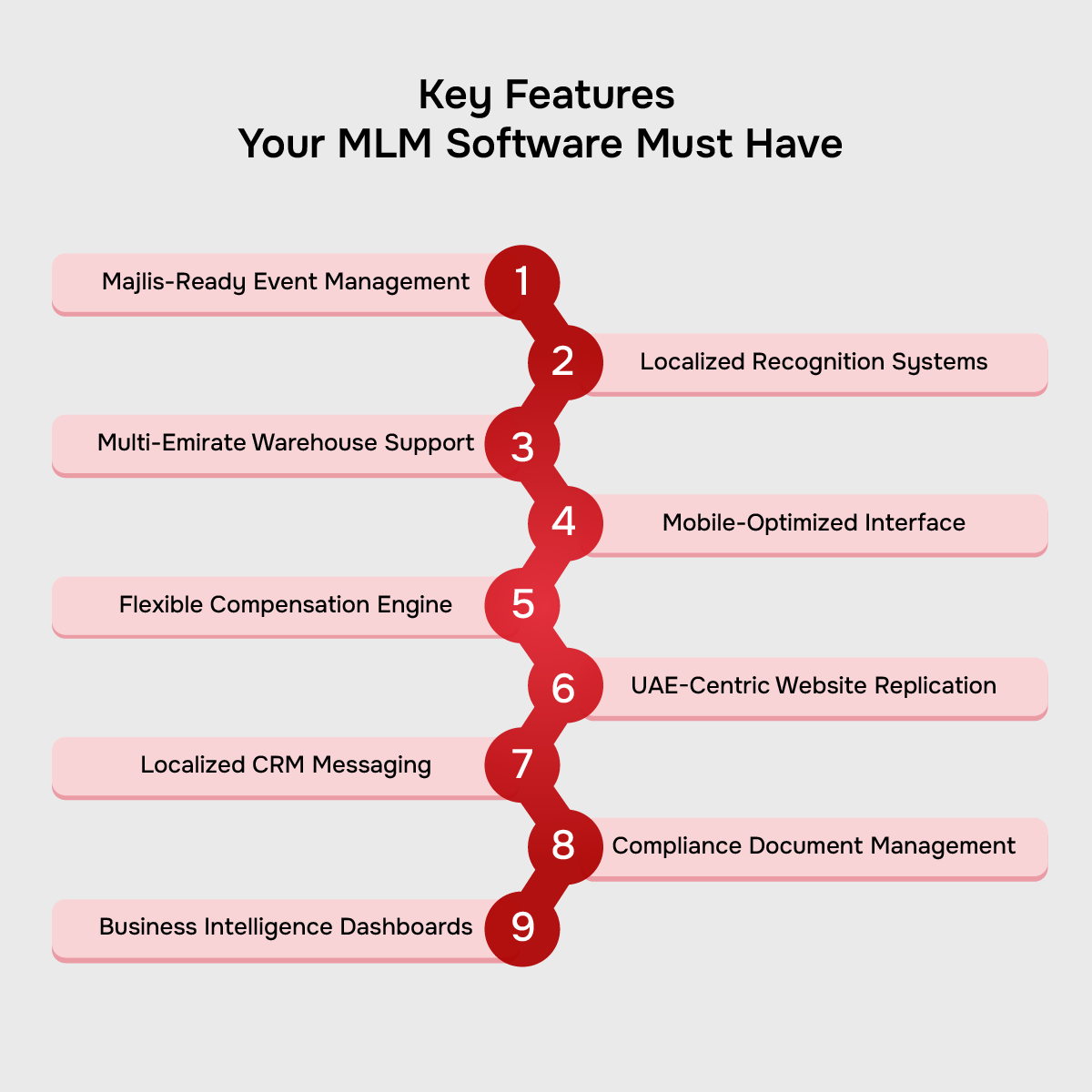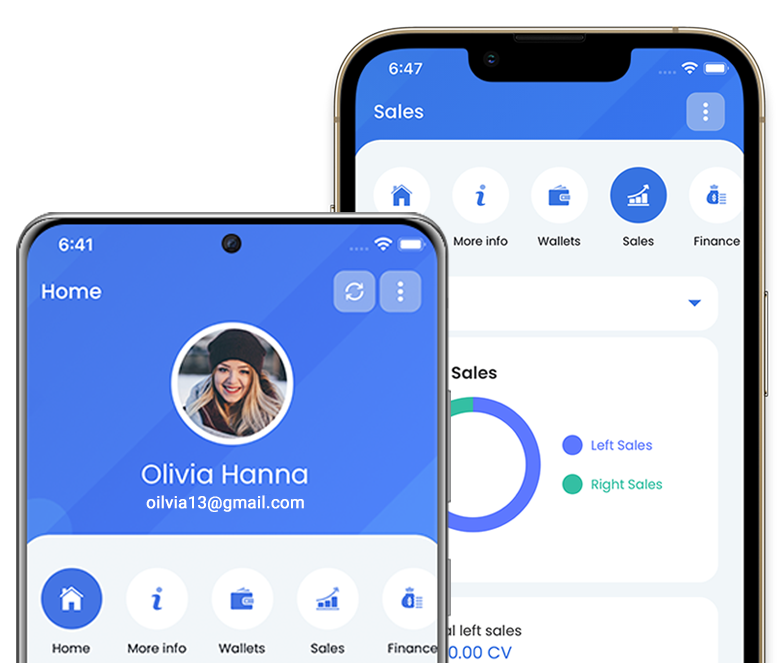MLM Software Buyer's Guide for UAE

- What to look for in your MLM software
- Essential features
- Regional compliances and regulations
- Localization features
- Free Zone considerations
- Local market preferences
- Technological integration
- Security and reliability
- Integration capabilities
- Vendor evaluation criteria
- Cost considerations
- MLM software buyers’ checklist
MLM businesses all over the world are opting for a specialized business management system which is custom designed for handling multilevel marketing and direct selling operations. The software efficiently automates distributor management, commission calculations, inventory tracking, order processing and more.
The UAE market is known for its adaptability to new trends and technologies. If you are thinking of setting up an MLM business in the UAE, we would say—go for it. However, with their diverse list of compliances and legal regulations—you will need assistance.
It can be overwhelming with a variety of MLM software options available. We get that. So, we have a software buyer’s guide for the UAE market, to help you choose the right fit for your business.
What to look for in your MLM software?
Besides automating processes, MLM software also helps build a solid foundation for expansion, compliance, and distributor success. By prioritizing features addressing the specific legal, cultural, and technical requirements outlined here, you'll establish a positive reputation and solid market standing. Following are some must-have functions of MLM software for UAE:


Majlis-ready event management: Tools for organizing and tracking traditional in-person gatherings with post-event follow-ups to nurture leads and build trust.

Localized recognition systems: Rank advancement tracking and public recognition that reflects Emirati values, titles, and hierarchy sensitivities.

Multi-Emirate warehouse support: Inventory and fulfilment features that manage stock across several Emirates, optimizing for regional logistics.

Mobile-optimized interface: Seamless smartphone access to business tools, essential in a market with 98% smartphone penetration.

Flexible compensation system: Configure any compensation plan such as unilevel, hybrid, matrix plans to ensure compliance with UAE laws.

UAE-centric website replication: Distributor replicated websites designed with local visual preferences, currency, language, and consumer behaviour in mind.

Advanced CRM with localized messaging: Communication templates, reminders, and workflows tailored to Arabic and English language norms.

Document management: Secure storage and access to distributor agreements, ID verifications, and government forms.

Business intelligence dashboards: Reports tailored to UAE-specific KPIs including performance across Emirates and distributor engagement by region.
Essential features in your MLM software
While closing in on an MLM software for your direct selling business, there are some significant features that ensure a stable market standing and brand-customer loyalty.

1. Automated functions like distributor onboarding, compensation plans, and order fulfilment.

2. Complex downline structures and multi-tier commission models with accuracy and transparency.

3. Intuitive tools to grow and manage distributor networks.

4. Compliance to UAE commercial laws, tax regulations, and adherence to digital security standards.

5. Real-time insights and analytics into the UAE market and direct selling industry.
Regional compliance and regulations
UAE's direct selling industry operates under strict regulations. Each Emirate—especially Dubai and Abu Dhabi—enforces distinct requirements through their respective Departments of Economic Development (DED). Beyond local business regulations, MLM companies must also abide to the federal laws like the UAE Anti-Pyramid Scheme Law of 2018—which prohibits recruitment-only income models. Which basically means that your MLM software needs to showcase your business as a product-first, transparent, and legal entity.
Islamic finance principles might affect your MLM business's operations. Additionally, the UAE has extremely stringent laws for data protection, anti-money laundering (AML), VAT compliance, and document retention. In short, your software should be flexible to accommodate the financial regulations. There are features that can assist businesses to keep up with all the compliances in the UAE, such as:

Commission transparency: Clearly distinguishes between product-based commissions and recruitment bonuses to comply with the UAE’s Anti-Pyramid Scheme Law of 2018.

DED alignment: Adapts to unique DED licensing and operational requirements across Dubai, Abu Dhabi, and other Emirates.

VAT compliance: MLM software automates 5% VAT calculation and integrates Anti-Money Laundering (AML) checks for financial integrity.

Identity verification: Includes secure Know Your Customer (KYC) workflows to verify distributor identities.

Consumer protection: Enables proper cooling-off period tracking and refund workflows in line with UAE consumer protection laws.

Regulatory recordkeeping: Maintains compliance with the 5-year documentation retention requirement mandated by UAE tax authorities.
Localization features in MLM Software for UAE MLM market
MLM companies planning to establish in the UAE must know that cultural alignment is important to connect with your target market. Software localization provides distributor engagement, builds good relationship with consumers, and ensures better growth possibilities for businesses.

Arabic language interface: Offers language support with right-to-left text rendering for both customer and distributor portals.

Localized business calendar: Aligns with the UAE’s Sunday–Thursday workweek and includes Ramadan-aware scheduling options.

Emirate-specific adaptation: Enables regionally tailored content, regulatory settings, and distributor structures for each of the seven Emirates.

Cultural communication tools: Provides culturally sensitive templates with proper honorifics and language cues to improve engagement.

Currency and payments: Supports AED currency display and integrates with local payment gateways like PayTabs, Network International, and Mashreq.

Time zone and regional languages: Adjust to UAE time zone and support popularly used languages for expat distributors and customers.
Free zone considerations
For MLM companies based in UAE, ‘Free Zones’ like Dubai Multi Commodities Centre (DMCC) or Dubai Silicon Oasis (DSO), are both compliant and favourable. Free Zone operations are attractive, however, to make use of the advantages such as 100% foreign ownership and tailored tax structures, they require specialized software configurations.

Tax structure flexibility: Accommodates differing VAT treatment and zero-tax environments for Free Zone operations compared to mainland business.

Support for foreign ownership models: Companies with full foreign ownership, a standard across most UAE Free Zones, are supported by the system.

Free Zone inventory management: Offers specialized tracking for goods held in Free Zone warehouses, including customs declarations and bonded inventory handling.

Individual commission structures: MLM software in UAE comes with custom payment plans for Free Zone-based distributors.

Free Zone-specific compliance reporting: Maintains correct documentation and reporting outputs for Free Zone authorities like DMCC or RAKEZ.

Support for cross-boundary distributors: Includes flexible KYC, payment, and onboarding workflows tailored for international distributors operating on UAE remote work or digital nomad visas.
Local market preferences
The UAE is shaped by deep-rooted cultural values, digital sophistication, and a diverse, expat-heavy population.
One critical example of UAE's traditions is “Wasta”—a cultural norm around influence and personal connections that plays a major role in how networks grow in the region. Your MLM software should fulfil customer expectations such as supporting relationship-driven sales, mobile-first engagement, and culturally relevant experiences.
Key customer acquisition features to look out for in your MLM software:

1. Wasta-aware relationship mapping: Visual tools to track connections and influence within a network which enables culturally aligned distributor engagement strategies.

2. Social media integration: Built-in support for social media platforms such as Instagram, WhatsApp, and other regional apps. This helps in sharing content, recruitment, and improving customer engagement.

3. Customer relations: Improve customer relations by sending personalized gifts, rewards, or vouchers, that reflect Emirati and regional gifting traditions.

4. Home party and demo support: Tools to organize, manage, and follow up on in-home product demos—a format especially successful among women distributors in the UAE.
Technological integration for MLM Software
AI, blockchain, and immersive tech are providing umpteen options for innovation in the Software-as-a-service sector. MLM software comes with similar innovation. Here’s what to look for if you want your software to keep up with the UAE’s digital-first business environment:
1. Smarter lead targeting with AI
Imagine your distributors being able to spot high-potential prospects before the first conversation even happens. Artificial intelligence can help analyze purchasing patterns and consumer behaviour to help your team understand the target market better.
2. Crystal-clear commissions with Blockchain
Transparency matters, especially in direct selling. Blockchain-backed commission tracking builds trust by showing distributors exactly how—and where—their earnings are coming from.
3. Product experiences with Artificial Reality
UAE consumers love premium, well-presented products. Augmented reality lets distributors show off items like skincare or home goods in stunning, interactive ways—no showroom required.
4. Virtual-first, Metaverse-ready tools
Whether it’s digital events or virtual product launches, platforms with metaverse capabilities help brands tap into the UAE’s tech-forward audience and long-term smart city vision.
5. Efficient video conferencing
Video tools and user interfaces in Arabic along with culturally respectful presentation options make team communication effortless.
6. Performance forecasting with Predictive Analytics
Smart dashboards help you track trends, anticipate sales shifts, and step in before distributor engagement dips. Think of it as your early-warning system for growth.
7. Hands-free shopping with voice commerce
With rising demand for convenience, voice-enabled ordering (especially tuned for Arabic commands) creates a smooth, accessible buying experience for customers.
8. Gamified incentives
Leaderboards and rewards are great—but only if they feel relevant. Look for software that lets you build culturally aligned challenges and recognition systems that genuinely motivate.
Security and reliability
The UAE has implemented the new Data Protection Law and established the UAE Data Office, creating specific compliance requirements. Additionally, the National Cybersecurity Strategy creates security obligations that software must accommodate. MLM software helps you in adhering to UAE Information Security Regulations, appropriate data hosting options, security management, regular security audits, comprehensive backup systems, etc.
For advanced data security you can expect the following functions from your MLM software:

1. UAE-compliant data residency: Local or regionally compliant cloud hosting to meet legal standards.

2. Security aligned with national frameworks: Encryption, secure APIs, and ongoing vulnerability assessments.

3. Regular backups and fast recovery: Built-in disaster recovery for business continuity.

4. Multi-factor authentication (MFA): UAE number support and seamless user access controls.

5. UAE time zone support: Technical assistance available Sunday–Thursday during business hours.

6. Transaction monitoring: Real-time alerts for suspicious activity and AML compliance.

7. Audit-friendly logging: Detailed, exportable logs for regulatory inspections.
Integration capabilities
A particularly important element is integration with government systems such as the UAE Pass digital identity platform and various emirate-level business portals. Integration with popular accounting software, local payment gateways including Islamic banking options, logistics service APIs is crucial.


UAE pass integration: Simplifies distributor onboarding and digital identity verification.

Emirates ID validation: Speeds up KYC processes in line with local regulations.

Local banking system support: Enables fast, automated commission payouts to UAE accounts.

Islamic banking compatibility: Supports Sharia-compliant payment gateways and financing models.

Integration with Emirate-level portals: Facilitates business registration and compliance reporting.

Accounting software connections: Syncs with Xero, Zoho, and UAE-adapted MYOB versions.

Marketing and email tools: Arabic language support and UAE time zone scheduling for campaigns.

Social media platform integrations: Automated post scheduling across Instagram, WhatsApp, and TikTok.

Digital signature compliance: Supports legally binding agreements under UAE e-signature laws.
Vendor evaluation criteria
A critical factor often overlooked is the vendor's relationship with UAE regulatory authorities. Vendors with established relationships with relevant authorities can provide valuable insights and faster adaptation to regulatory changes. When evaluating potential providers, consider their presence in the UAE/GCC region, knowledge of local regulations, Arabic-speaking technical support availability, responsiveness during UAE business hours, implementation capabilities, frequency of regulatory updates, customer references, transparent pricing, understanding of Free Zone vs. mainland requirements, and capacity to provide documentation for business license applications.

Regulatory coordination: Vendor relationships with UAE regulatory authorities significantly impact compliance adaptability.

Localized support availability: Arabic-speaking technical support during UAE business hours is essential for operations.

Market structure expertise: Experience with Free Zone vs. mainland businesses affects implementation success.

On-ground implementation support: Local implementation partners reduce cultural and operational friction during setup.
Cost Considerations for UAE MLM Software
Implementing MLM software in the UAE isn’t just a technical decision—it’s a financial one that varies significantly based on your business structure, localization needs, and compliance requirements. Whether you're setting up in a Free Zone or on the mainland, it’s important to understand how these choices impact your total cost of ownership.
Expect higher implementation costs in the UAE due to Arabic support, legal compliance, and Emirate-specific configurations. Being upfront with vendors about these requirements can help you avoid hidden costs and plan your budget more accurately.
Key Cost Factors:

Free Zone vs. Mainland setup
Software costs vary significantly depending on your business jurisdiction and regulatory complexity.

Arabic language implementation
Adds an estimated 15–20% to base software costs due to RTL UI design and localization.

Customization and compliance features
Expect to budget an additional 20–30% for features tailored to UAE regulations and cultural needs.

Regulatory compliance costs
Allocate 10–15% of your budget for UAE-specific features like VAT setup, document retention, and KYC.
Build a compliant and scalable MLM business in the UAE with software tailored for legal certainty, Arabic localization, and distributor empowerment.
Get Free DemoMLM Software Selection Checklist for the UAE Market
With strict legal frameworks, seven distinct emirates, and a uniquely relationship-driven sales culture, your platform must do more than run commissions—it must empower your network, ensure compliance, and scale with local expectations.
This checklist distils the essential capabilities your MLM software must offer to thrive in the UAE market—from compliance and localization to technical readiness and vendor expertise. Use it to confidently evaluate potential software partners before you invest.
Compliance and localization

Regulatory alignment: Fully compliant with UAE MLM laws, including Anti-Pyramid Scheme Law and VAT regulations.

Arabic language support: Full right-to-left language compatibility with localized UI/UX.

Cultural and Emirate-specific customization: Adaptable branding, content, and business logic per Emirate.

Islamic finance compatibility: Features supporting Islamic banking principles and halal product categorization.

Payment gateway integration: Support for UAE banks, Islamic banking options, and local processors.

Free Zone operations support: Tools to accommodate Free Zone licensing structures, warehousing, and tax treatment.

Multilingual options: Arabic plus support for other major UAE languages like English, Hindi, and Urdu.
Core Business Functionality

Flexible compensation engine: Customizable plan builder aligned with UAE regulations.

Genealogy and distributor management: Robust tools for downline tracking, team growth, and ABN/EID integration.

Mobile-responsive distributor portal: Optimized for the UAE's high mobile usage.

Ecommerce capabilities: AED pricing, local shipping integration, and personalized storefronts.

Inventory and order management: Support for multi-warehouse, cross-Emirate distribution.

Rank and recognition system: Customizable levels with culturally relevant rewards.

Relationship-based selling support: Tools for managing events, follow-ups, and majlis-style gatherings.
Technical and integration readiness

Cloud or On-Premise deployment: Scalable solutions with UAE-compliant hosting options.

Open API architecture: Seamless integrations with accounting, logistics, and CRM tools.

Mobile app for field force: Native apps with offline functionality and Arabic UI.

Security and data privacy: UAE Data Protection Law compliance, data residency, and MFA for local numbers.

GovTech compatibility: Readiness for UAE Pass, Emirates ID validation, and DED portal integration.

Next-gen tech: AI for prospecting, blockchain for commission transparency, AR for product demos.
Vendor and implementation qualities

UAE-based support: Arabic-speaking teams available during Sunday–Thursday business hours.

Proven market experience: Demonstrated understanding of UAE's regulatory and cultural landscape.

Regulatory relationships: Existing ties with DEDs and Free Zone authorities to streamline setup.

Culturally attuned implementation: Local partners who ensure smooth onboarding and adoption.

Training and onboarding: Resources tailored to UAE distributors with regional examples and best practices.

Client references: Case studies or testimonials from UAE-based MLM companies.
Case studies and success stories
Read from our customers how we have been helping MLM organizations stay one step ahead of rising competition and customer expectations.
Lead the UAE’s direct selling market with an MLM platform designed for VAT compliance, Free Zone support, and seamless integration with local systems and languages.
Get Free DemoConclusion
The direct selling sector of UAE is booming. In 2023, retail sales reached approximately $51 million, indicating a resilient market with potential for expansion. Moreover, the broader social commerce sector is booming, with projections estimating it will reach $1.22 billion in 2024 and grow to $2.86 billion by 2029.
To manage an exponential growth in sales, selecting the right MLM software for your UAE business is a strategic decision. By evaluating solutions against the criteria outlined in this guide, you can identify software that meets current needs and supports future growth. Successful MLM operations in the UAE depend on balancing global best practices with local market requirements.
The UAE's position as a business hub connecting East and West creates unique opportunities for MLM companies but also demands software solutions accommodating this distinctive marketplace.
